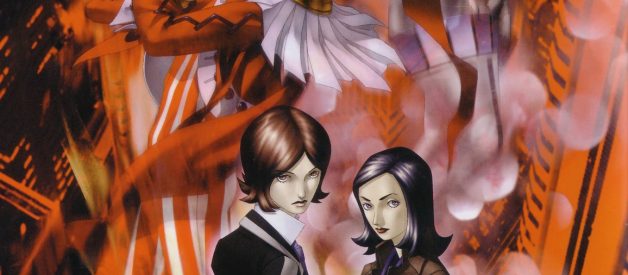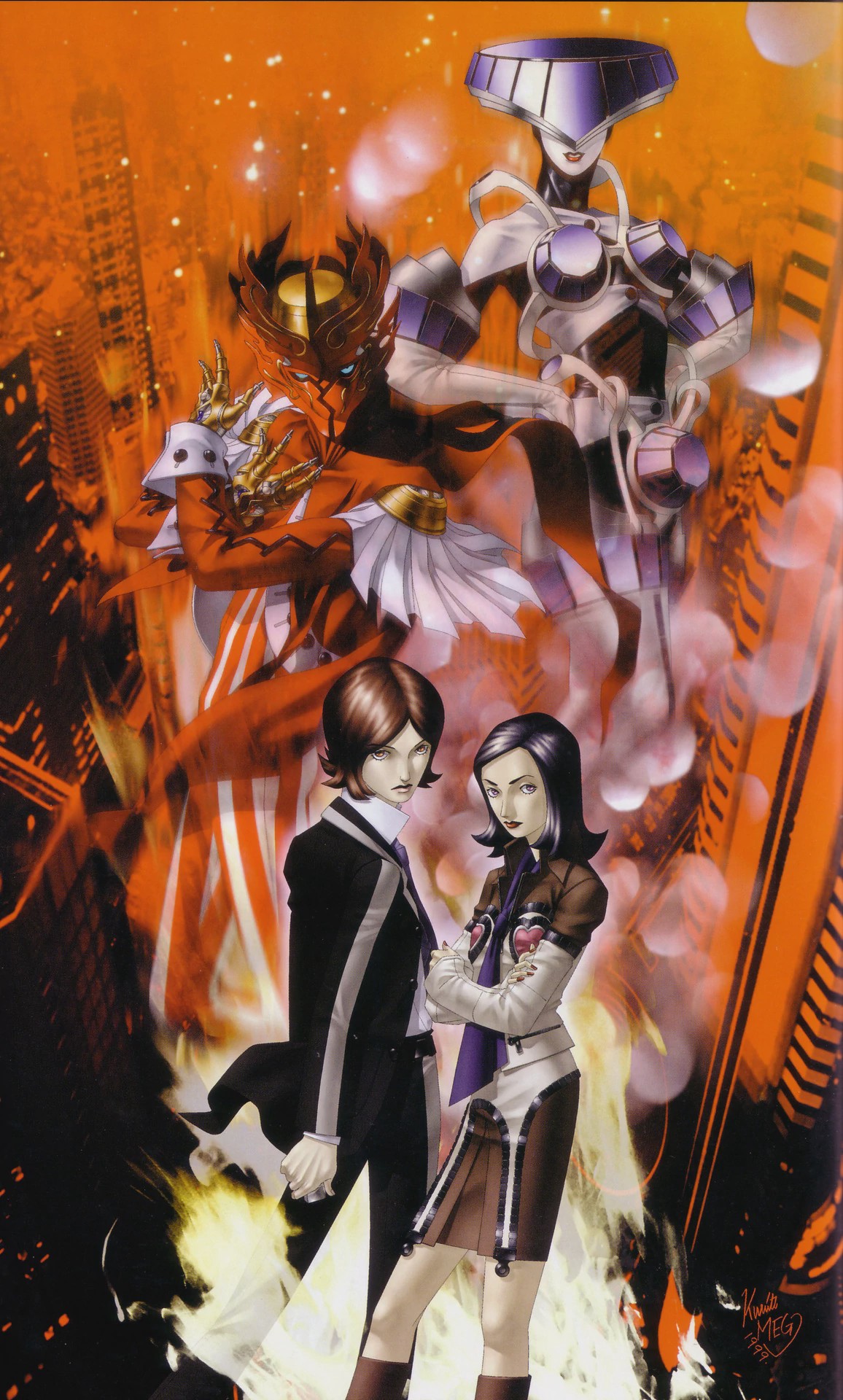 A legendary classic
A legendary classic
- This article has been updated and edited. Rectified misinformation.
- Disclaimer: This piece will contain some spoilers for Persona 2, read at your own risk.
Celebrating the 20th anniversary release of Persona 2: Innocent Sin, a predecessor of the millennial Persona titles and the prequel of Persona 2: Eternal Punishment.
Persona 2 remains to be an underrated classic JRPG.
The duology is often overlooked, as it?s held back by its archaic gameplay and graphics. But be that as it may, the game still holds a special place among retrogamers? hearts.
It?s the sheer depth of storytelling and thematic eccentricity, that makes the old school classic shine out from modern day RPGs.
The game was ahead of its time with its mind-blowing story, well-written cast, and deep Jungian-psychological narratives?and most notably, for its positive representation of queer characters.
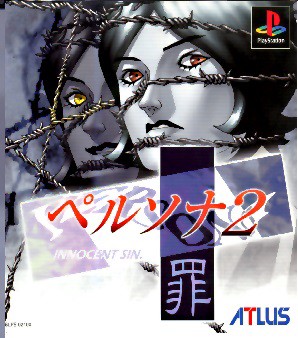 Persona 2: Innocent Sin PSX cover, presenting Tatsuya and his shadow self lurking behind.
Persona 2: Innocent Sin PSX cover, presenting Tatsuya and his shadow self lurking behind.
Queer representation has been a murky road in the Persona series, a mixture of good and bad. The latest title of the series, Persona 5, is subjected to criticism for its homophobic depicture and contradictory narratives.
A much concern, as it proves that the series has regressed overtime with its portrayal of marginalized communities.
That said, many are unaware that the Persona 2 duology had introduced positive queer representation long before its overshadowing successors and other mainstream JRPGs.
Thus?
Persona 2 stands as its own quirky gem, that defies the sexual and gender expectations imposed by society.
 Authentic 90?s PSX opening intro scene in Persona 2: Innocent Sin
Authentic 90?s PSX opening intro scene in Persona 2: Innocent Sin
Romantic Relationships
Persona 2: Innocent Sin does not contain the advance dating sim elements as the newer titles, but it does allow players to form romantic relationships with cast members.
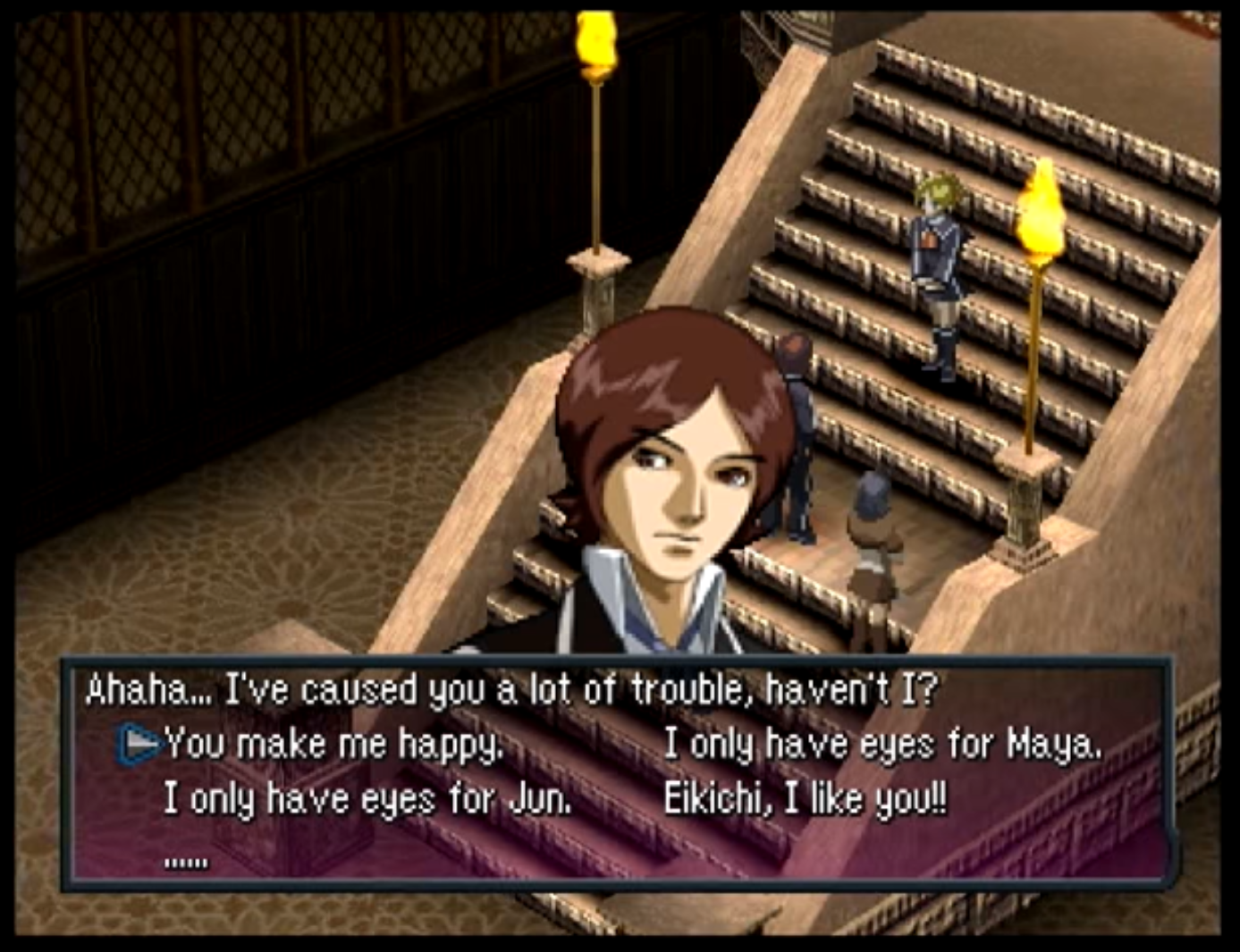 The toughest choice in the game!!
The toughest choice in the game!!
The player?s romantic choices: Lisa Silverman, Maya Amano, Jun Kurosu and Eikichi Mishina. As well as having the option to pursue no romance ??.?.
Eikichi is not a pursuable option?which leaves Lisa, Maya, and Jun being the pursuable romances in the game.
Out of the three romances, the protagonist can choose?.Lisa ? a girl who is madly in love with him, Maya ? an older sister figure and Jun ? his childhood best friend, Jun is the male love interest.
It?s extraordinary to know that this old school JRPG is the only game in the series to have a male homosexual romance. Besides, being released at a time where homosexuality was perceived more of a taboo.
The game offering players to choose their desired love interest (regardless of gender), as well as having the option to not pursue one, gives players the great liberation to express themselves freely.
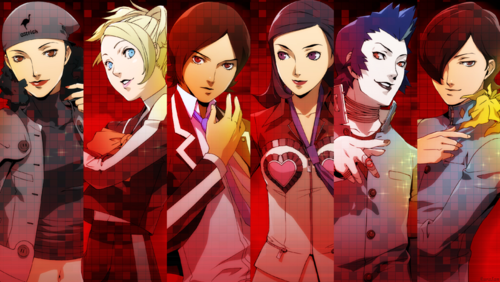 Persona 2 Innocent Sin Main Cast: Yukino Mayuzumi, Lisa Silverman, Tatsuya Suou, Maya Amano, Eikichi Mishina and Jun Kurosu.
Persona 2 Innocent Sin Main Cast: Yukino Mayuzumi, Lisa Silverman, Tatsuya Suou, Maya Amano, Eikichi Mishina and Jun Kurosu.
What?s more impressive about Persona 2 is its remarkable character writing. The main cast are not reduced to one-dimensional stereotypes and are humanly designed; having flaws that make them human and not written for the sake of it. The characters all share emotional backstories and suffer from realistic insecurities, in which players can relate to.
Each member expresses their personalities with true individualness and originality ? which makes Persona 2 having one of the most lovable cast in the Shin Megami Tensei (SMT) franchise.
In various forms of fictional media, queer characters are often presented in a poor fashion either to be mocked at, antagonized or tokenized. Persona 2 negates this.
Persona 2?s non-heterosexual characters are treated with the utmost respect and dignity. They are not defined by their sexualities and are treated as normal human beings.
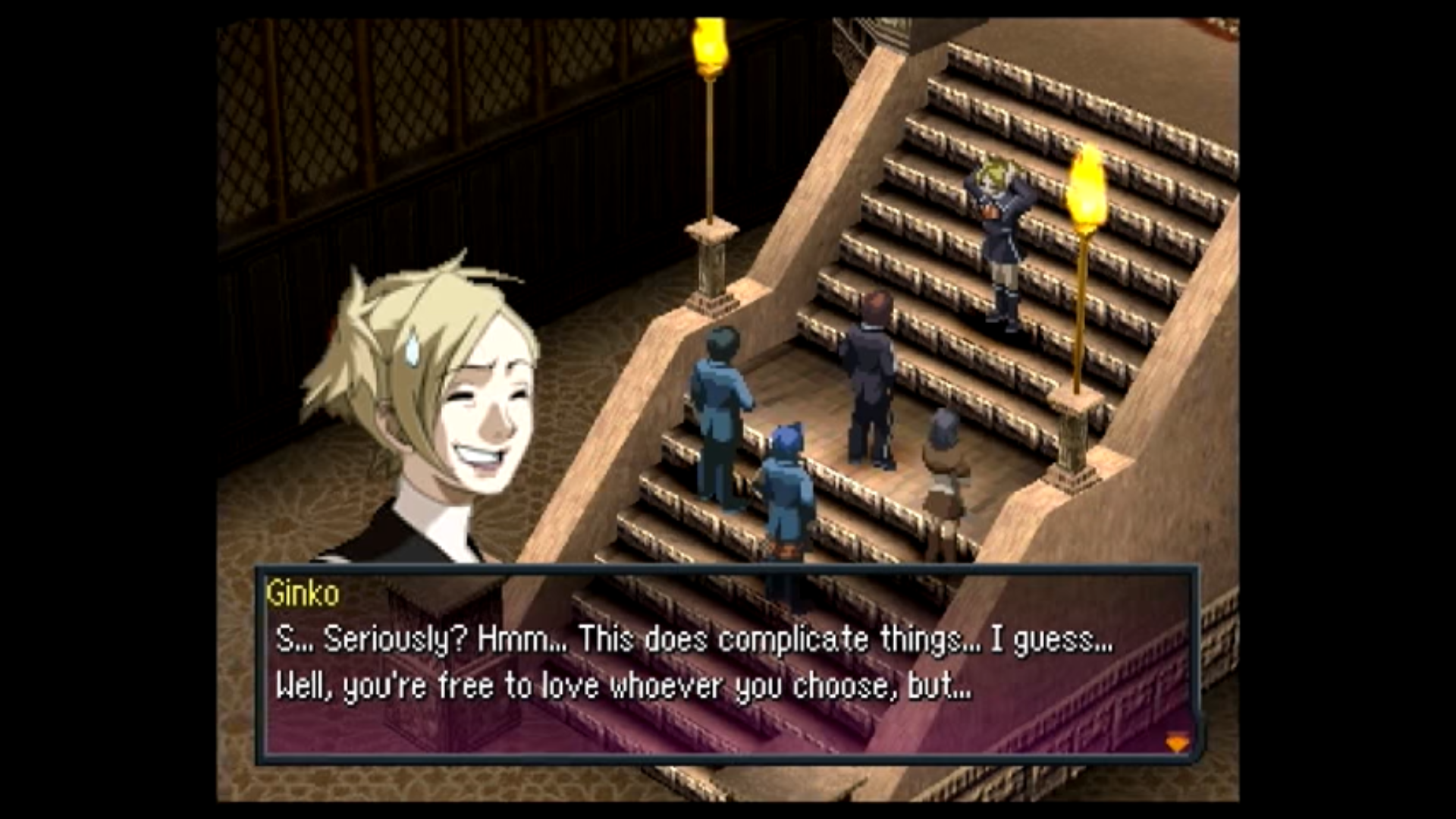 Selecting Jun as a romantic choice: Lisa is surprised by the response as she was rejected by a male love rival; her dialogue simply conveys it will be more difficult for her to win the protagonist?s affection. Nonetheless, she still supports the relationship and aims to continue her battle for love.
Selecting Jun as a romantic choice: Lisa is surprised by the response as she was rejected by a male love rival; her dialogue simply conveys it will be more difficult for her to win the protagonist?s affection. Nonetheless, she still supports the relationship and aims to continue her battle for love.
Tatsuya Suou
 Tatsuya Suou: A Motherf-king Badass
Tatsuya Suou: A Motherf-king Badass
Tatsuya Suou can be considered his own character as he has a proper backstory and expresses agency in the game. He also appears as a major character in Eternal Punishment.
?That?s right?I remember now?A sin that must not exist?How do I atone??
– Tatsuya Suou, Persona 2: Eternal Punishment
Childhood trauma has caused Tatsuya to grow up socially distant and withdrawn from people. Despite isolating himself, he is very popular in school, due to his good looks and the lone-wolf aura he emanates. Tatsuya is also referred to be a delinquent as he gets into a lot of fights (fights that are not initiated by him), and teachers questioning his direction in life?.in which Tatsuya is undecided about.
Although he projects a ?bad-boy? image, Tatsuya is actually a shy socially-awkward individual, who prefers to keep to himself.
The game reveals Tatsuya?s personal share of talents and his interests, some of them being quite idiosyncratic. Examples being: riding motorcycles, perform realistic sound impressions, play the guitar, discuss manliness, etc.
Which pretty much makes him a lovable dork.
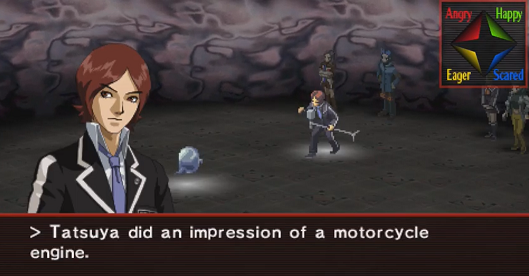 ?close your eyes?
?close your eyes?
Another aspect of Tatsuya?s identity is his bisexuality, which is implied throughout the game.
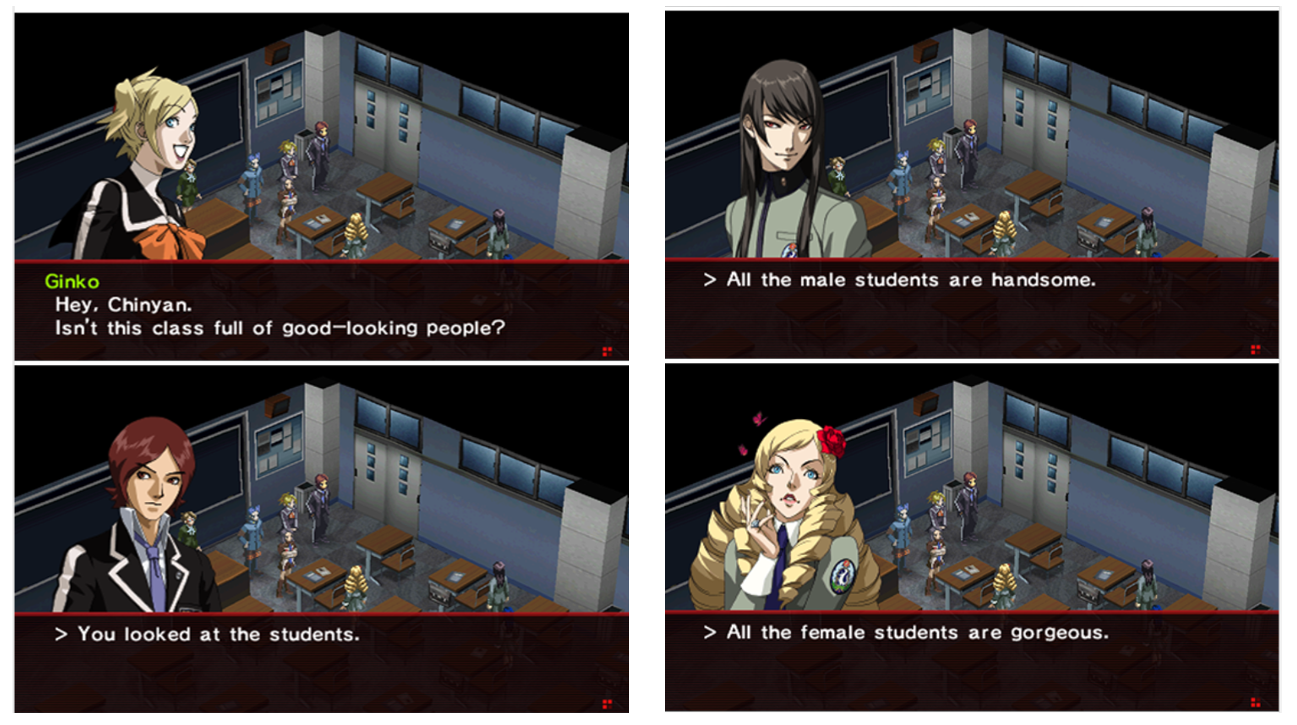 The PSP port included sidequests, the image above shows Tatsuya agreeing silently.
The PSP port included sidequests, the image above shows Tatsuya agreeing silently.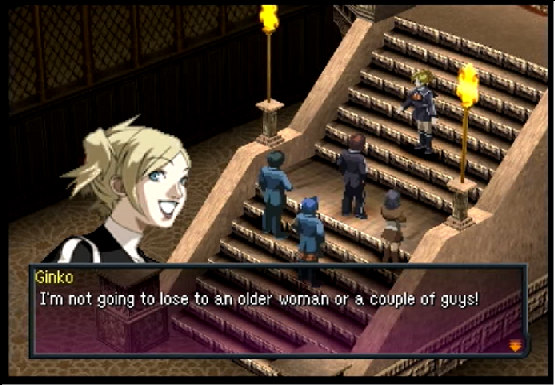 Lisa says this line to all the dialogue choices for the endgame romances, which proves that she is aware of Tatsuya?s attraction to both sexes.
Lisa says this line to all the dialogue choices for the endgame romances, which proves that she is aware of Tatsuya?s attraction to both sexes.
Most of Tatsuya?s implied bisexuality is derived from party members discussing his relationship with Jun.
Jun Kurosu
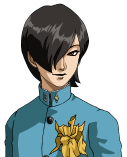 Jun Kurosu: OG Joker and Flower Boi
Jun Kurosu: OG Joker and Flower Boi
Jun Kurosu is one of the most well written homosexual characters I have seen in video game history. He plays a major role in Innocent Sin and is a minor character in Eternal Punishment.
?People often compare their goals to the stars. They shine brightly even after the sun goes down? fixed stars in a dark expanse.?
– Jun Kurosu, Persona 2: Innocent Sin
The game heavily implies that Jun has romantic feelings for Tatsuya and that he bears no attraction to the opposite sex.
By appearance, Jun does appear to have a feminine physique, and it?s occasionally stated in the game that he is more beautiful than females?going far to describe his beauty that of a Goddess. Lisa, a love rival and childhood friend, has expressed her friendly envy of his beauty.
Flowers are one of Jun?s keen interests, an interest that is commonly classed to be feminine. His love for flowers expands to his encyclopedic knowledge of them, as well as having the ability to understand their language, hanakotoba (The language of flowers). In battles, Jun can use flowers as a weapon to strike enemies ? think of him as the Tuxedo Mask of Persona.
The game doesn?t ridicule his feminity as well as his homosexuality. Instead, it is positively expressed as Jun embraces his feminine manhood with high respect, he doesn?t feel ashamed of his identity nor hides it.
His characterization doesn?t stop at his sexuality and appearance alone, it goes beyond that. Jun is central to the story ? both as an antagonist and as a hero.
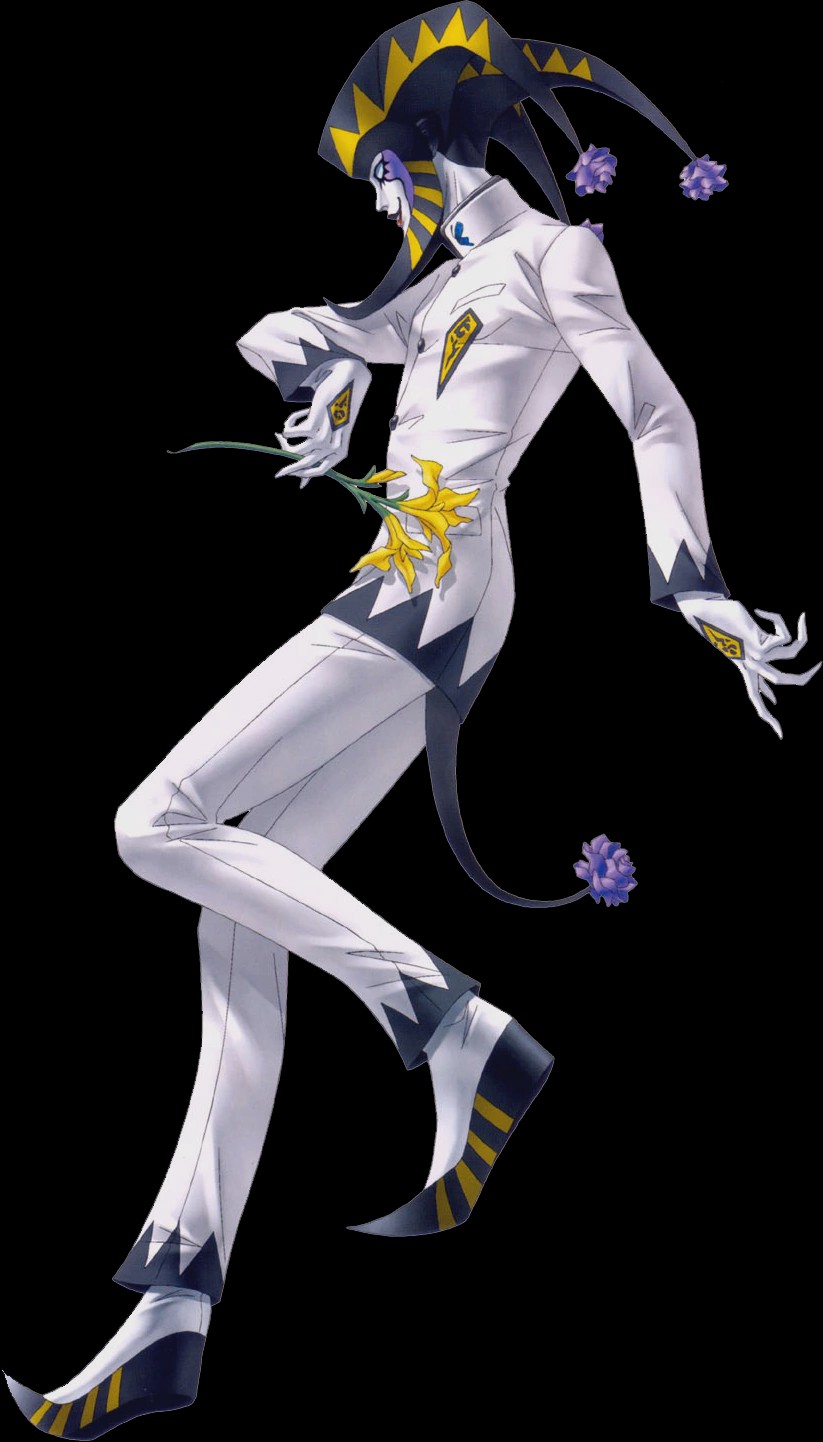 ?A masked figure rumored to grant one?s dreams. Why he does this, and who he is, is a complete mystery.?
?A masked figure rumored to grant one?s dreams. Why he does this, and who he is, is a complete mystery.?
In fiction, it is true that a lot of LGBTQ+ characters play villainous roles ? which can serve to be demeaning as they are mostly depicted to be hypersexualized or to be laughed at ? but for Jun it?s different.
His sexuality is not villainized, and his role as the antagonistic Joker is ?positively? impactful and engaging. Joker is theatrical, intelligent, charismatic and intimidating ? attributes that make him a well-designed baddie.
It is rumored that the Joker can answer wishes submitted to him by a phone call. However, if the person who summons them doesn?t have a wish on their hearts, Joker instead claims the dreams of his victims, and reduces them to shadows of their former selves. The Joker tends to leave behind flowers as a reminder to his victims of the sins they?ve committed ? Extracted from Megami Tensei Wiki
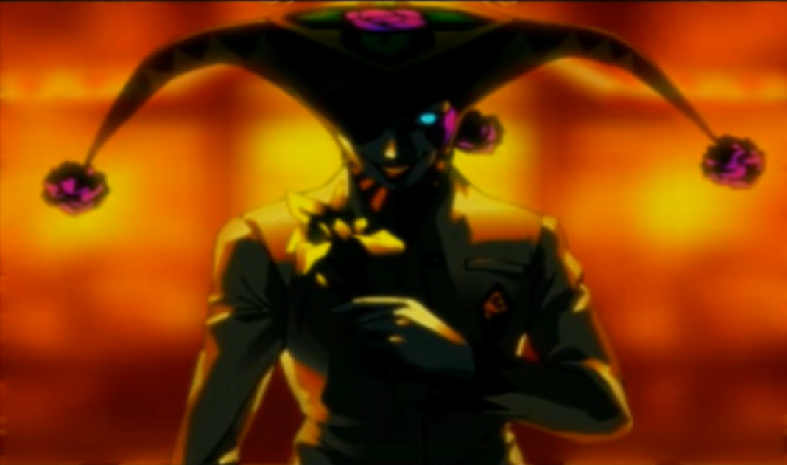 Joker?s menacing appearance in the PSX opening intro of Persona 2: Innocent Sin
Joker?s menacing appearance in the PSX opening intro of Persona 2: Innocent Sin
As his own self, Jun is a calm young man who happens to have a strong sense of resolve. He seeks the betterment of humanity and aspires to help people achieve their dreams. Even more so, Jun put others before himself, as he is willing to protect people.
The game highlights that Jun was an easy target of bullying due to his feminine mannerism and appearance. With that being said, Jun has always stood up for himself, and shown himself to be a force to not be reckoned with ? further supports how courageous he is.
Just like Tatsuya, Jun got labeled as a delinquent because of the many fights he was involved in. However, it doesn?t necessarily mean he behaves like one. In fact, he is the complete opposite.
Matching similarness to Tatsuya, Jun is a shy introverted young man, who has an array of hobbies and talents; Hanakotoba being one of them and horoscope reading being the other.
 Eikichi?s band Gas Chamber: Eikichi as the lead vocalist, Tatsuya on the bass and Jun playing the electronic keyboard, showcasing their musical talent.
Eikichi?s band Gas Chamber: Eikichi as the lead vocalist, Tatsuya on the bass and Jun playing the electronic keyboard, showcasing their musical talent.
Jun also excels in academia, having a bright scientific and inventive mind, indicating that Joker?s intelligence is derived from Jun?s own intellect. When the situation fits, Jun can also pull acts and manipulate people to give in to his demands, either persuaded by his beauty or by his meek acting (a handy quirk that can aid him and his friends in battles). Overall, Jun cares about people deep down and seeks to fight injustice, abiding by his own moral code to do what?s right.
In a way, Jun?s characterization exceeds simplicity. He has a complex backstory, one that is rather tragic and has shown to have qualities that don?t confine to his orientation. He is a positive display of a homosexual character and as a person.
Unused data files have suggested that Jun was going to be the protagonist of Eternal Punishment, the idea is pretty revolutionary considering Persona 2 could have had the world?s first gay JRPG protagonist.
Tatsuya Suou and Jun Kurosu?s Relationship
Characters and demons have noted that Tatsuya?s relationship with Jun is more than ?just friends?.
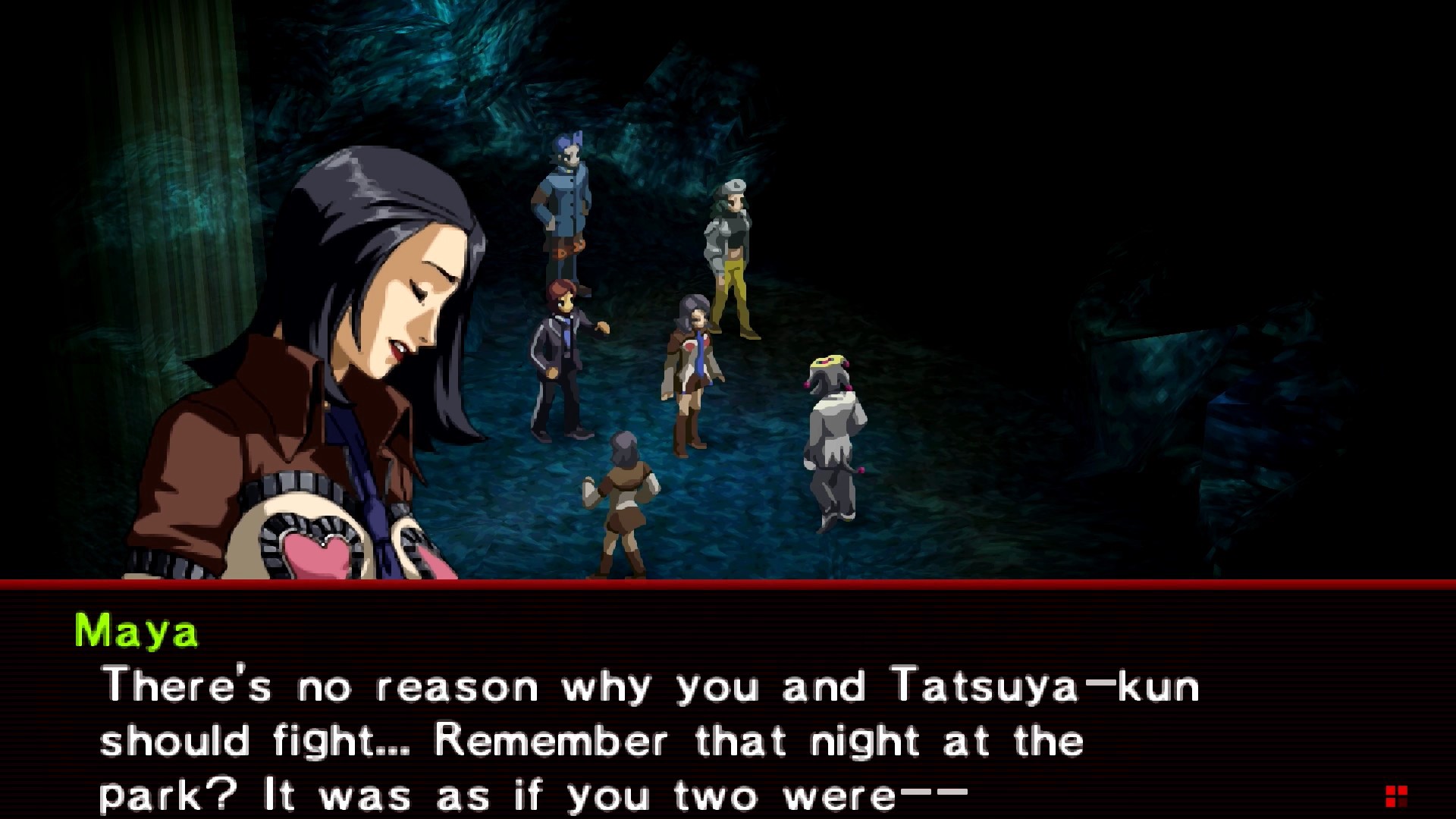 Maya was aware of their strong bond since they were children.
Maya was aware of their strong bond since they were children.
At one point in the game, Maya claims that Tatsuya and Jun are their doppelgangers, the two mirror each other ? being like each other shadows.
Maya recited Franz Schubert?s song ?Der Doppelgnger? (1828):
?The night is still, the streets are quiet.
In this house lived my Love.
She left the town long before,
Yet her house still stands in the same place.
There I also see a man standing,
Staring into the heavens,
Wringing his hands in violent grief.
I shudder as I behold his face
The moon reveals to me my own likeness.
You Doppelganger, you pale companion.
Why do you mimic my lovesickness,
That tormented me at this place,
For so many nights in the past??
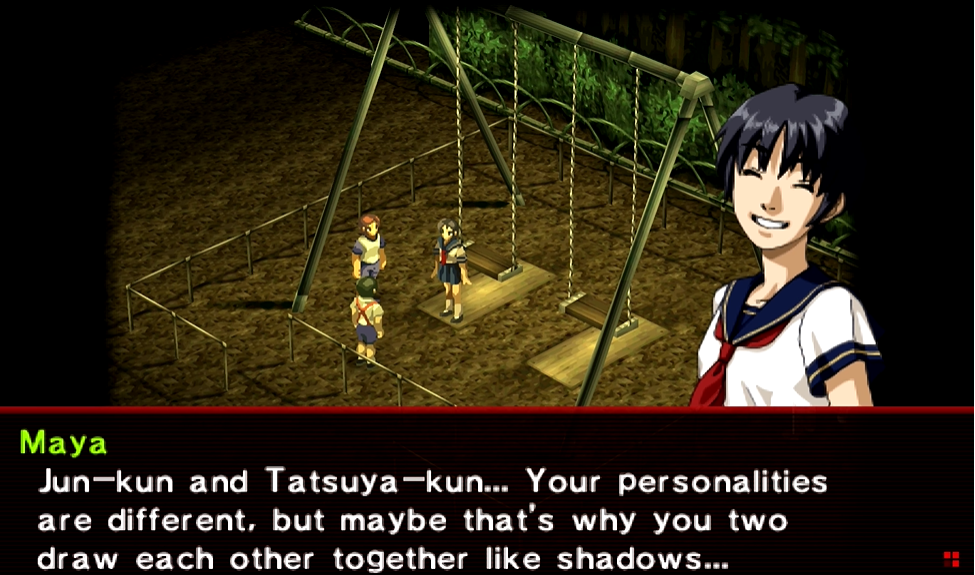
Deconstructing it symbolically, this can be described as:
Tatsuya?s other-self being Jun, and Jun?s other-self being Tatsuya. One cannot let go of the other-self, as their selves are part of them?
As they are part of each other.
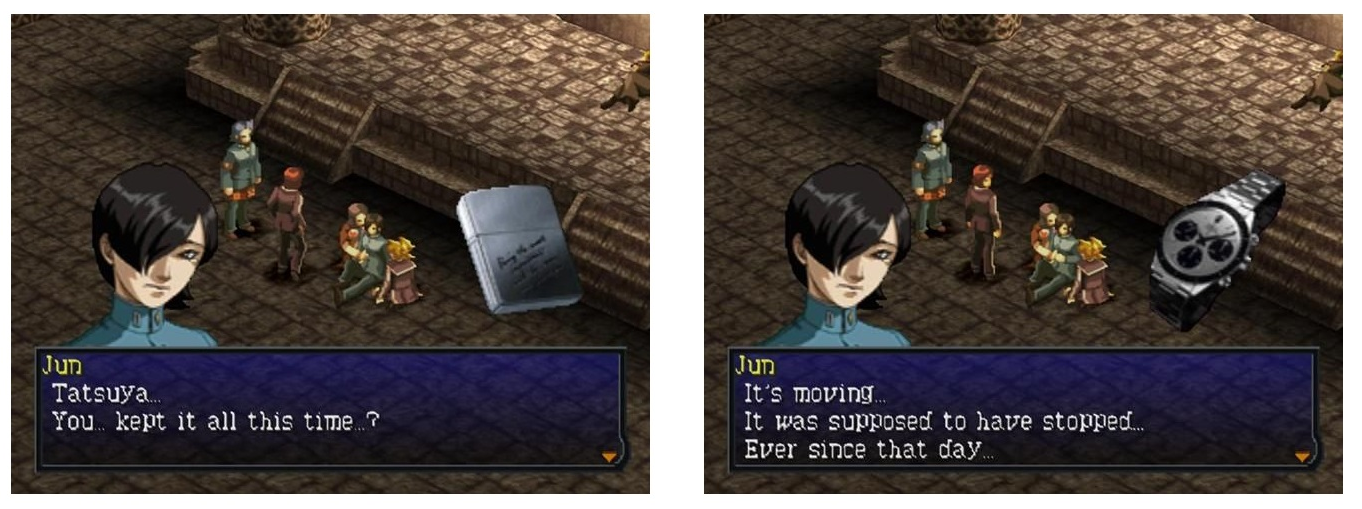 Jun comments on the treasures that he and Tatsuya exchanged when they were children.
Jun comments on the treasures that he and Tatsuya exchanged when they were children.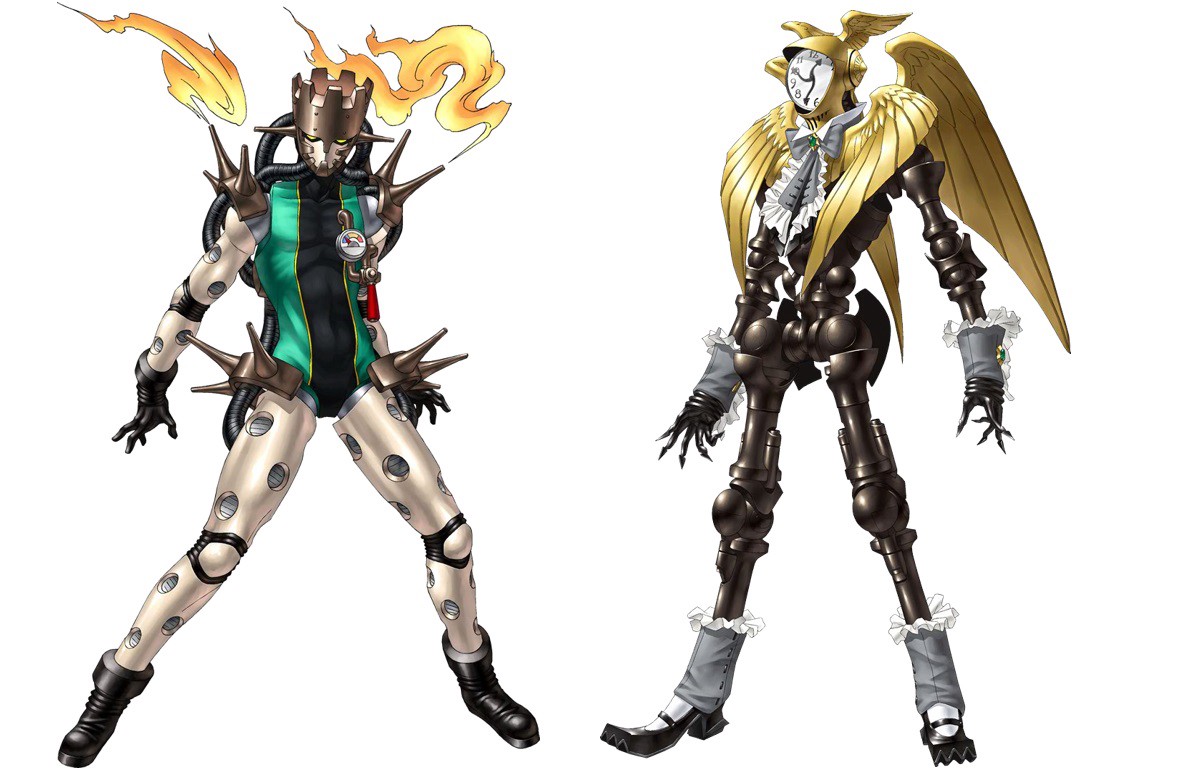 ?Tatsuya and Jun?s exclusive Personas are representative of the exchange of their ?treasures? as children?- Megami Tensei Wiki, Valcanus and Cronos
?Tatsuya and Jun?s exclusive Personas are representative of the exchange of their ?treasures? as children?- Megami Tensei Wiki, Valcanus and Cronos
The mainline of SMT?s style of Demon Negotiations does influence into Persona 2?s gameplay, they are called ?Contact?.
Whether be it ?Best Friends.? or ??Lovers??, Jun and Tatsuya?s contact combination remains exact. Their contact interaction involves both males behaving affectionately to one another. Demons have amusing and interesting reactions to Tatsuya and Jun?s contact combination:
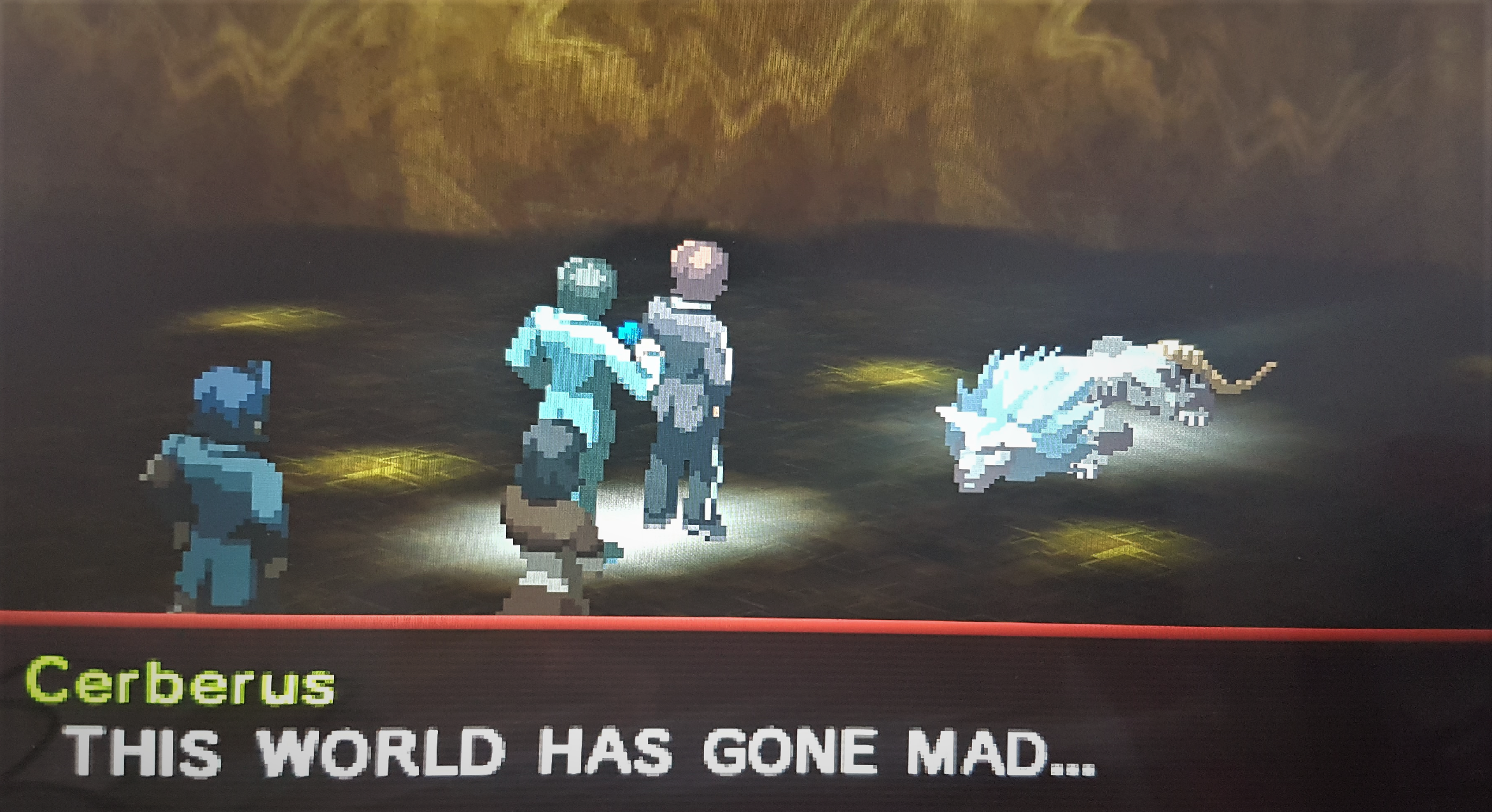 Some are terrified
Some are terrified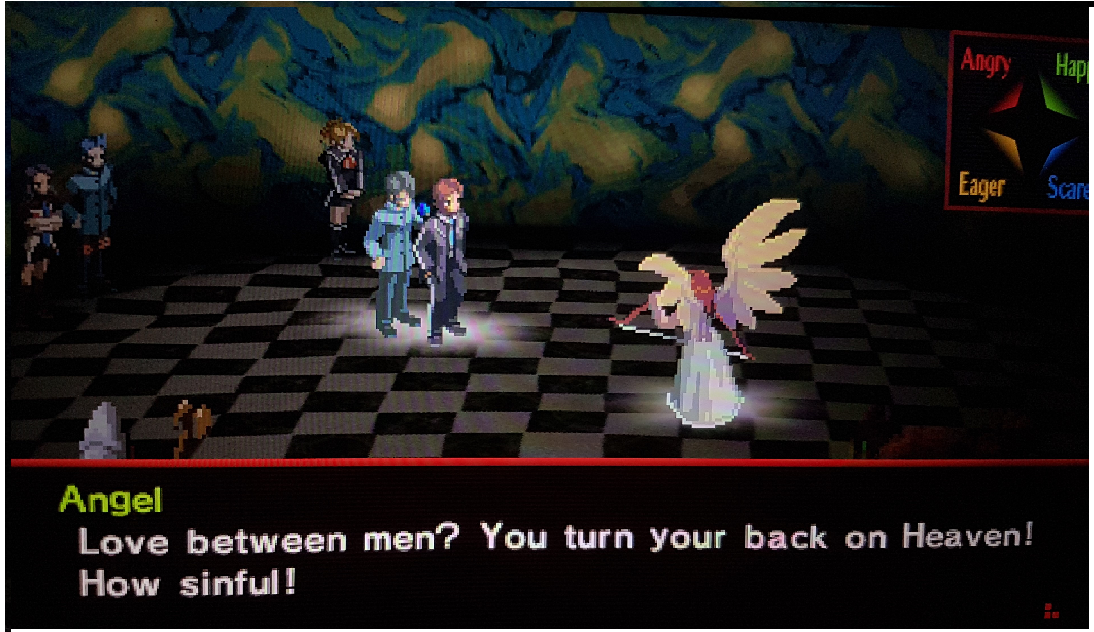 Some are offended
Some are offended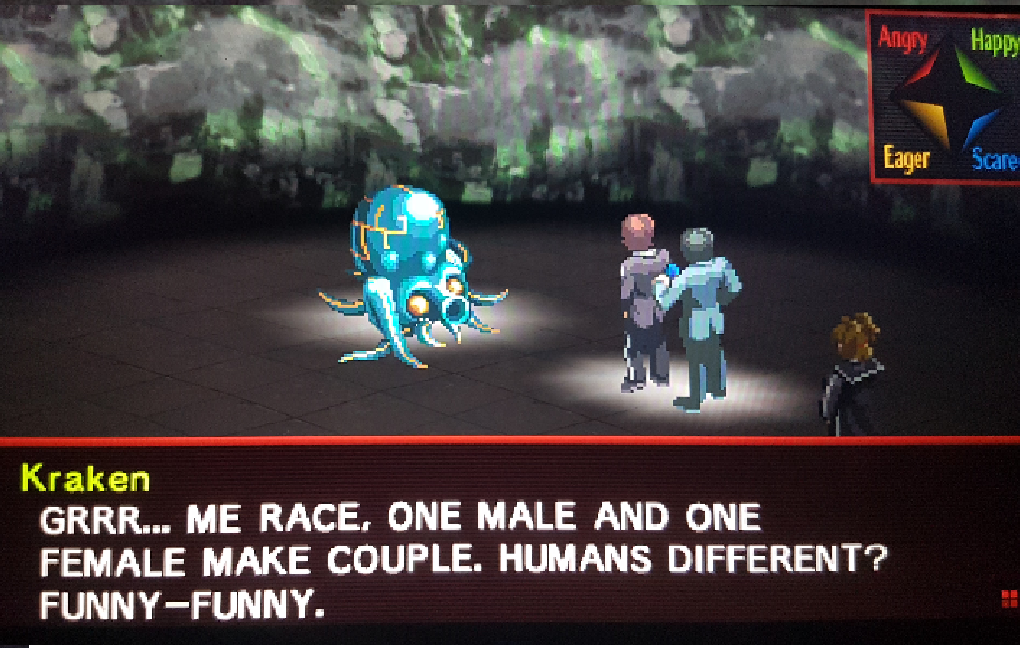 Some find it funny
Some find it funny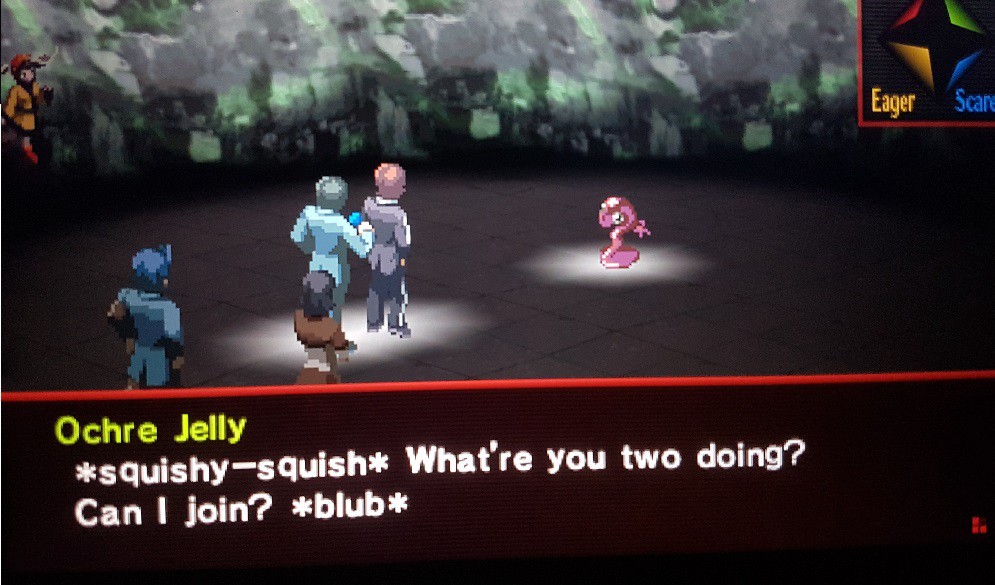 Some are curious
Some are curious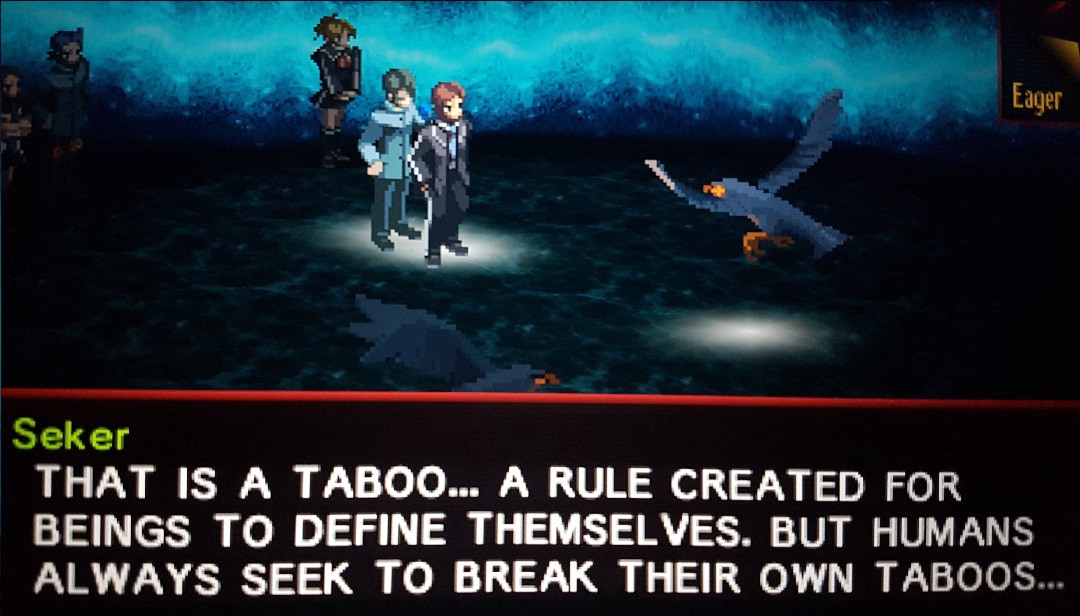 And there are those who support it
And there are those who support it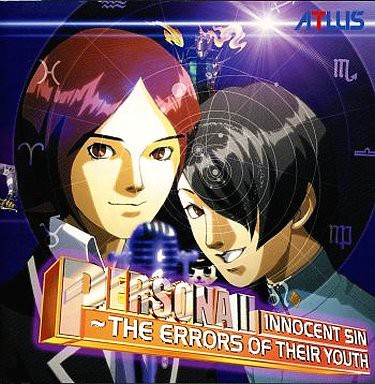 Tatsuya and Jun being on the cover of ?The Errors of their Youth? Audio Track
Tatsuya and Jun being on the cover of ?The Errors of their Youth? Audio Track
In interviews, Kazuma Kaneko (Co-Creator and Art Director of Persona 2) and Satomi Tadashi (main writer of Persona 2) has shown support for Tatsuya and Jun?s relationship. Kaneko believes that their romantic relationship is the most probable in the game.
The reasoning for why the developers wanted to introduce Jun?s character and homosexuality into the game is a complicated one. Atlus (the game?s company), wanted to see if they could appeal to Japan?s Yaoi fanbase, a community (mostly compromised of young females), that indulges and values homosexual relationships between fictional men. As Yaoi during the 90s was a growing market, the developers sought it as an opportunity to accumulate sales ? therefore, the inclusion of the homosexual relationship was a calculated-money driven decision to pander a specific audience group.
Whilst the motive was faulty and somewhat doubtful, the inclusion for the relationship was also intended for experimental means. The developers wanted to see the audience?s reaction to Jun and Tatsuya?s relationship and discover their perceptions of non-heterosexuality.
Persona 2 is more aligned to the SMT mainline, compared to its successors who opted more for the mainstream J-Pop genre. The SMT mainline is known for addressing taboo topics; bringing out philosophical, religious and scientific debates into the light, and challenging the notions of morality. For the developers wanting to bring out the taboo of non-heterosexuality into the public and out in the open, it?s commendable. Moreover, the relationship is handled with care. It wasn?t done in a fetishizing fashion and it was portrayed as a neutral healthy gay relationship.
Anna Yoshizaka
 Anna Yoshizaka without her mask
Anna Yoshizaka without her mask
?A dropout from Seven Sisters High. Currently dissolute, but she was star of the track team before her accident.?
-Anna Yoshizaka?s Character Introductary, Persona 2: Innocent Sin
Anna Yoshizaka is a side character, who works for Joker under the alias of Lady Scorpio. Depending on particular choices in the game, she can ally with the main cast later on into the story or be their enemy.
Anna is shown to have a cold personality, much like Tatsuya, both are distant and withdrawn from people. In Persona 2: Eternal Punishment, both Anna and Tatsuya are more acquainted with each other. And funnily enough, she too is labeled a delinquent, as she has gotten into her fair share of roughhousing.
The game implies that Anna has romantic feelings for main cast member Yukino Mayuzumi, an old friend of hers. Anna?s love for Yukino is unrequited but they still care about each other.
She also stars as a protagonist in the official novelization of Persona 2: Innocent Sin, written by Mie Takase (2011). It is set in the events before the game?s story: How Anna lost her dream of becoming a star athlete and how her journey of becoming Lady Scorpio began. In the novel she confessed to Yukino using a line from the poem ?Erlknig? (1815):
?Ich Liebe dich, mich reizt deine shne Gestalt? which translates to ?I love you, and am captive to your beautiful face?.
Just as Tatsuya and Jun, her character and sexuality are handled with respect.
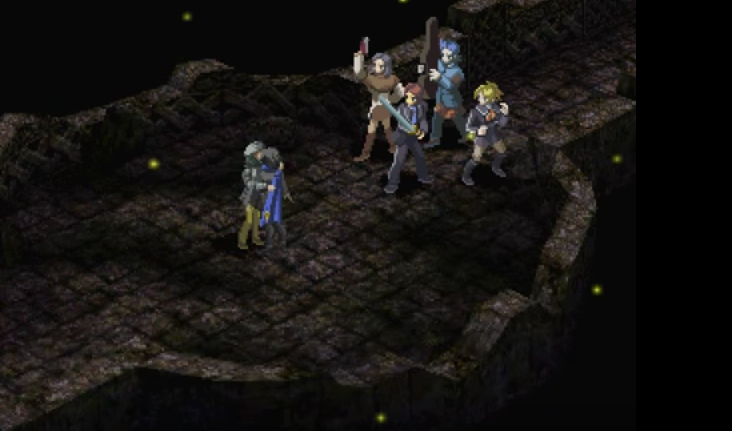 Shadow Yukino kissing Anna. The first and only lesbian kiss exhibited in the Persona series.
Shadow Yukino kissing Anna. The first and only lesbian kiss exhibited in the Persona series.
Noriko Katayama

?She looks up to Anna and is also a track and field athlete.?
– Noriko Katayama?s Character Introductory, Persona 2: Eternal Punishment
A minor side character, Noriko Katayama is Anna?s underclassman. She looks up to Anna with great admiration. The game implies that her admiration and devotion to Anna can be thought of as romantic.
She is not involved as much in Innocent Sin, but she plays a bigger role in Eternal Punishment.
Sumaru Genie
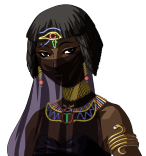 Sumaru Genie also known as Anita
Sumaru Genie also known as Anita
?A husky-voiced fortune teller who knows a lot about rumors. Rumored to be seen sometimes in the parts of the city that come alive at night??
– Sumaru Genie?s Character Introductary, Persona 2: Innocent Sin
Sumaru Genie (also known as Anita) is an intersex Fortune Teller NPC, who is able to spread rumors in the game world (a system that makes rumors turn into reality). She can also tell players? their fortune, granting them possible bonuses/status effects in battles.
Intersexual portrayal in media is rare and hard to come by, so kudos to the previous developers for creating Anita.
Transwoman NPC in Rosa Candida shop
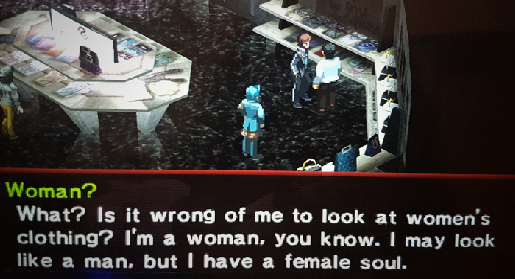 This is one of the few positive lines quoted by the Trans NPC, the rest of her interaction was made out to be a joke.
This is one of the few positive lines quoted by the Trans NPC, the rest of her interaction was made out to be a joke.
There is a Transwoman NPC in the game, unfortunately, her character was made out to be a joke.
Her characterization started off with potential meaning but as the story progress, she is then stereotypically presented as hysterical and lunatic. A common harmful depicture of Transwomen in media.
The Transmale NPC in Hirasaka armor shop is another victim of this. Once he undergone his sex change, his transformation story was comedically presented (updated).
Atlus has an unpleasant historical record with their portrayal of Trans characters?and recently, it is exacerbated by the depiction of the controversial Catherine: Full Body Trailer.
Besides their regression, it is worth mentioning that there is a Drag Queen bar owner in Persona 5, named LaLa Escargot. She isn?t a Trans character but she does present herself as female as part of her Drag Queen lifestyle. She isn?t ridiculed and is humanly presented, so it?s a given nice change in the Persona series.
Additional Mentions
The pixelated world is very much alive in Persona 2.
NPCs and Demons have their own distinctive personalities and share their own perception of the world, shaped by their beliefs and values? making Persona 2?s storytelling even more absorbing and immersive.
There are minor NPCs existing in the game, who have their own sexualities and their expression of gender norm defiance ? A once reluctant schoolboy who crossdresses for his school festival cafe, ends up seeing an appeal to it. In Eternal Punishment, the Sauve Rumor-Lovin? Lady Bartender is quite charming and flirtatious to the Protagonist Maya.
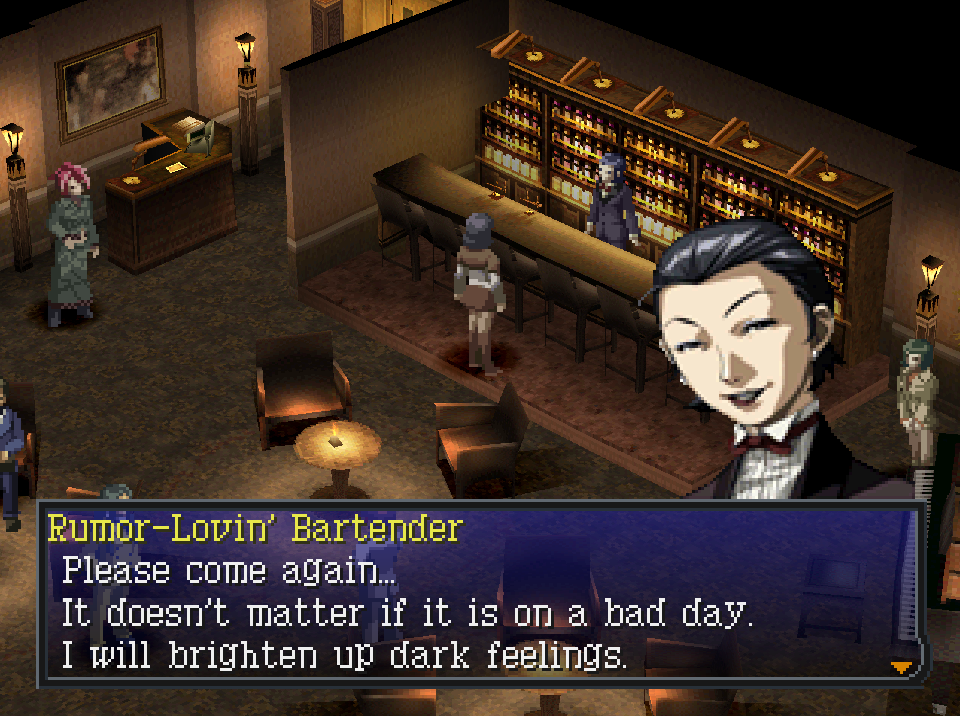 Such suave Such style
Such suave Such style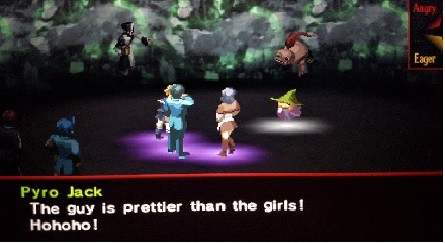 Pyro Jack flattered by the seduction combo of Maya, Lisa, and Jun
Pyro Jack flattered by the seduction combo of Maya, Lisa, and Jun
Demons have expressed their queerness too. Such as the Kinnara, Succubus and even the little Pyro Jack.
To recapitulate, Persona 2 was indeed to be exceptionally ahead of its time. Supported by its creativity, marvelous writing and its praise-worthy originality?Persona 2 is a game that challenges societal social norms and breaks the queer taboo.
Persona 2 is not only progressive for its queer representation, but it has also shown to be very respectful to its female characters. Female characters like Lisa, Yukino, and Maya, and Eternal Punishment main cast members Ulala Serizawa and Eriko Kirishima, expresses sexual agency and are empowering figures.
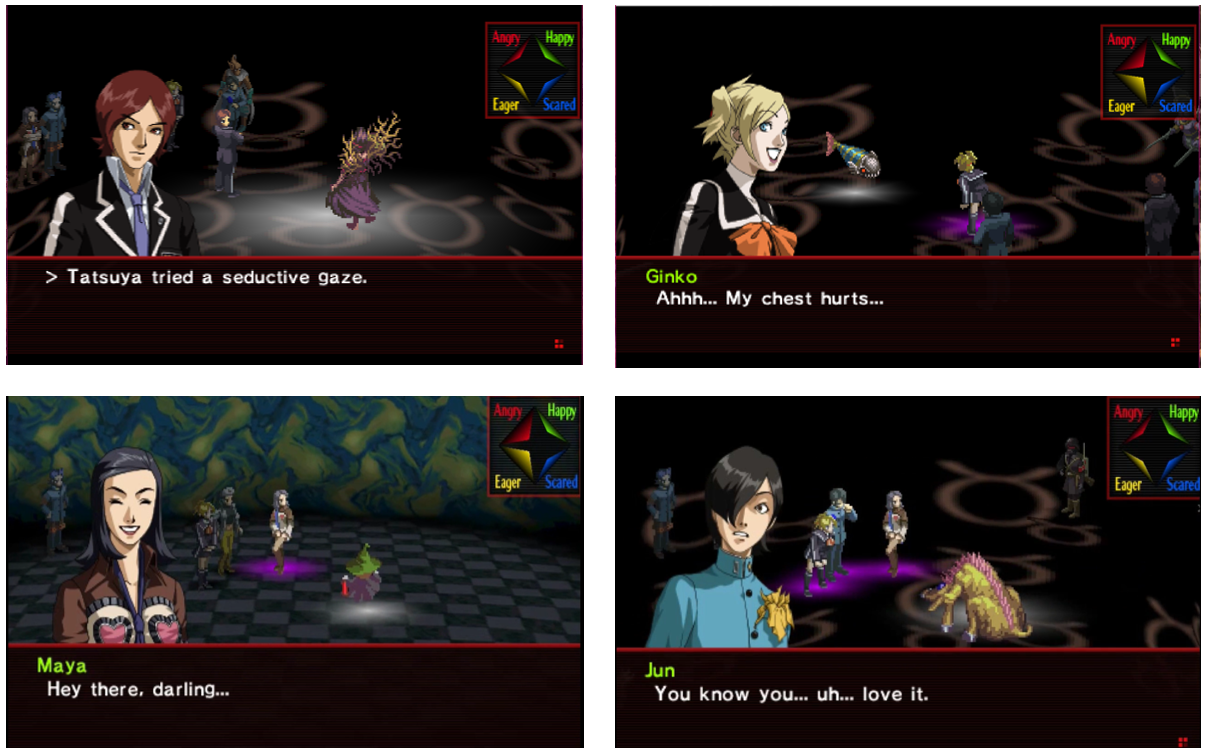 The Art of Seduction in Persona 2: Innocent Sin ? characters contacting demons.
The Art of Seduction in Persona 2: Innocent Sin ? characters contacting demons.
They were not made to be objectified and they all act with agency. Lisa particularly can show off her sex appeal as it corresponds to her character. Moreover, she?s not afraid to show off her perverted side too.
Which is pretty refreshing to see that of in a female character, as it subverts the expected-gender normalcy. Furthermore, Lisa?s character arc bought awareness on the issues of xenophobia and race fetishization.
 Maya Amano: ?Let?s think Positive!?
Maya Amano: ?Let?s think Positive!?
And of course, Maya is an excellent female character, very loved and well-received by the retro-videogame fanbase. Her protagonist role in Eternal Punishment and her deuteragonist role in Innocent Sin can provide that.
Her spunky nature, leadership and optimistic attitude make her a great inspiring role model for young people.
 Eikichi?s glorious narcissism and smooth talk
Eikichi?s glorious narcissism and smooth talk
Eikichi being a fan favorite, has also shown to be a complex character. His character story and his relationship with Miyabi Hanakouji (a side character in Innocent Sin) have contributed to the elements of body positivity. Delivering awareness on eating disorders, body stigmatization, and the harmful effects of bullying.
Emotional maturity and character development exist throughout the game. Reflecting back to the series? Jungian-psychological narratives, the entity of shadow selves was first introduced in Persona 2.
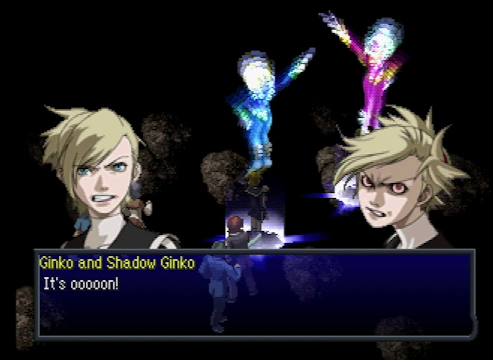 Lisa battling out her shadow self.
Lisa battling out her shadow self.
Characters having to encounter their dark counterpart, they witness their insecurities, flaws and the image that they deny?.simply the denial of themselves. After defeating their shadow selves, the characters come to accept their existence.
In a sense, they have learned to accept their own faults with content, and aim to become the best versions of their selves.
This narrative promotes an image of positive growth and self-acceptance.
All in all, the game emerges outstandingly, alongside with its progressive themes and empathetic characterizations. The experiences of the main cast are genuine and grounded, evoking profound emotional responses to players ? as they are able to connect with them.
Persona 2 is a game that is truly empowering.
To wrap it up, Persona 2 has demonstrated to players to not be ashamed of who they are. That there are many versions of ourselves that we should embrace. After all, humans are multifaceted beings.
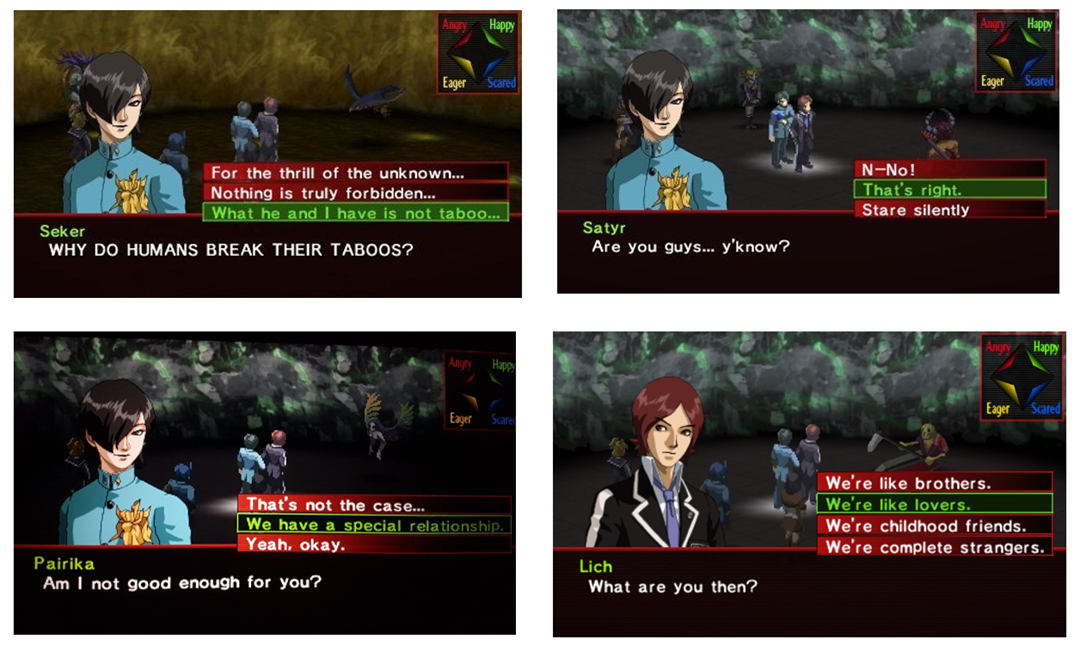 An early example of Gay Pride
An early example of Gay Pride
Our differences are what makes us human, and no one in the world should be excluded in society, based on their sexuality, gender, race, ethnicity, body, beliefs, and class? We are all unique individuals and should be rightfully treated with equal respect.
We should hold our heads high and be proud of who we are.
Time for the classic catchphrase!
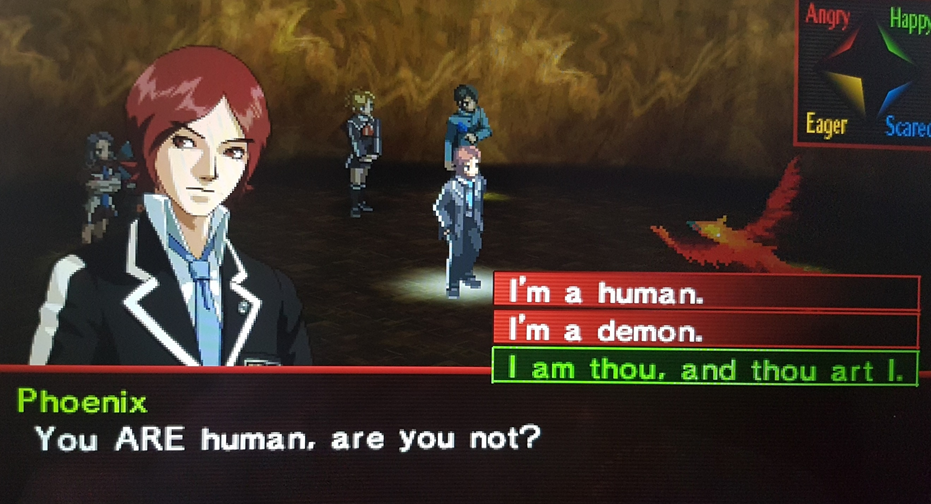 You tell it Tatsuya!
You tell it Tatsuya!
